Why new book celebrates Joe McGhee – our ‘forgotten’ gold medallist
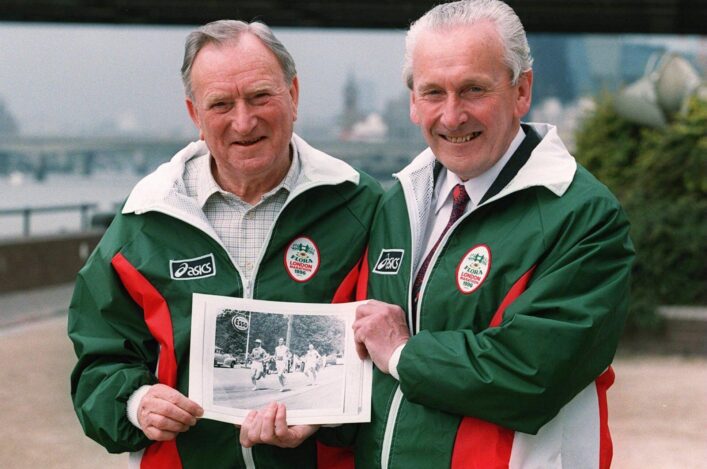
Joe (on right) with Jim Peters when they met again in 1996 – and the photo of Joe leading the Vancouver race (photo via the McGhee family)
Joe McGhee: Tribute piece on this website back in April 2015
By Peter Jardine, Head of Comms
Joe McGhee is Team Scotland’s forgotten Commonwealth Games champion – winning the marathon in Canada in 1954 in a Vancouver heatwave.
Against all odds would the (very short) summary of events all those decades ago but now candidly told in a new book written by the man himself a number of years ago and thankfully now published.
It is a Scottish sports story which in many ways chimes with Paul Lawrie‘s Open Championship victory in 1999.
Joe was by no means the race favourite back in 1954 and indeed wasn’t even regarded as a medal contender – even by the Scotland team selectors of the era!
Two Englishmen, Jim Peters and Stan Cox, were the fastest marathon runners in the world at the time and lined up more in expectation of medals than hope. The Canadian pick had home advantage and two Australians and two South Africans were strongly fancied if the weather was warm-to-hot.
It was to be exactly that – the race started at the hottest point in the day at 12.30pm – and a simple internet search confirms that Saturday 7 August was indeed the hottest day of the year in Vancouver in 1954 at 30 degrees Celsius (86 degrees Fahrenheit).
As if to underline his status, Joe recalls being picked for the 1954 Empire (Commonwealth) Games by the Scottish selectors by virtue of a ‘marketing’ strategy.
‘I was the last athlete in all sports into the team,’ he writes.
‘The clinching argument in my favour seemed to be based on the grounds of advertising rather than a realistic hope of a medal. The comment was that, with me, the Scotland vest would be carried for two hours around the streets of Vancouver, whereas a sprinter might only be seen for only about ten seconds!’
How much more than two hours was the moot point come August 7, as it happened.
Joe had won the Scottish Championship – effectively a trial and raced in late May to give the winner time to prepare for Canada – with 2:35:22 a new Scottish Record. He was the youngest Scottish marathon champion at the time at 24.
His English rival in Vancouver, Jim Peters, was meanwhile setting a World Record at 2:17.4 and the first man to go sub 2:20.00 for the marathon (highly regarded as a key time barrier in the 1950s). Peters broke the World Record four times prior to the Games.
See what we mean about McGhee being unfancied?
What Happened Next could have been a Question of Sport question for the ages and indeed requires some YouTube research.
Deep into the race, with fellow Englishman Cox having run himself into the ground (metaphorically) in the extreme heat and into a Vancouver lamppost (in actual fact), Peters was well clear in the final stages. More than a couple of miles clear, in fact.
But it 26.2 miles ain’t over until 26.2 miles are covered and the 0.2 proved too problematic as Peters entered the stadium and careered around the track like a Saturday night drunk in Glasgow. Officials initially resisted the urge to help him for fear of a DQ but, in fact, the stricken Peters could not finish the race.
‘The crowd had been shocked into silence by the collapse of Peters,’ recalls Joe in the book.
‘’What is the next man going to be like?‘ was the question uppermost in minds as I entered the stadium. They did not even know who was coming next so little information had percolated back to the stadium.
‘I ran into pandemonium. I have never received such a reception. My ears popped with the din as I raced around the track to become, at 25, the youngest marathon winner in the history of the Empire Games.
‘It was only as the call came for the victory ceremony that I realised the enormity and sheer unexpected nature of my achievement. I stopped on the way to the podium to congratulate Roger Bannister who had earlier the same afternoon won the Miracle Mile against John Landy (well worth as YouTube watch, too).
‘That victory ceremony with the Scottish Saltire hoisted high remained an unforgettable memory for me.’
Joe’s book available via Pitch Publishing
Joe and Bannister later visited Peters in hospital. The Scot learned how close the Englishman had come to dying, he writes.
‘The doctor told me he had never seen a human being so dehydrated.’
Pathe news clips place a heavy focus on Bannister win – Landy was the only other athlete to have run sub four minutes for the mile – and Jim Peters.
In time, and after returning home to Falkirk, it is clear the ubiquitous focus on Jim’s collapse – rather than the gold medallist – irked Joe to the extreme.
As he puts it rather pointedly:
‘In recording 2:39: 36 I ran 30 seconds slower per mile than what I was capable of (he ran 2:25 the following year). Peters obviously did not. A World Record time was simply out of the question that day. The whole point of the exercise, surely, was to win the medal and each of us was chosen by our country to try and do just that.
‘I managed to do so for Scotland. Jim did not. A ‘glorious failure‘ is all very well but it does not disguise the fact that he ran an unintelligent race.’
So who was Joe McGhee?
He emerged via a very small club in Stirling, St Modan’s AAC, and ran for Glasgow University Hares and Hounds. Later he joined Shettleston Harriers and was coached by Allan Scally.
Serving in the RAF (at Turnhouse) in the countdown to Canada, that didn’t prevent him fitting in a regular 15-mile lunch-time run.
He moved into teaching and lecturing in later life. Osteoarthritis curtailed his running but that didn’t stop him using a bike on the house and even a trampoline to maintain fitness. Joe passed away in 2015 aged 85.
Now some ten years later the family have worked with Pitch Publishing to bring out the book and hopefully share the story with a wider audience.
On Hogmanay 1953, Joe McGhee ran 12 miles. On New Year’s Day 1954, he ran 30 miles. He wasn’t even close to being selected for the Empire Games at that time. But he wanted to make sure he was ready in case chosen for Canada.
How did he celebrate on August 7? He danced till dawn at the Closing Ball and then, after attending Mass at 6am, took an early train to the United States to visit Seattle with some of his Team Scotland pals (after they had brokered visiting visas).
Before, during and after the 1954 Commonwealth Games marathon, Joe McGhee was just champion.
The Forgotten Winner is available via publishers Pitch Publishing
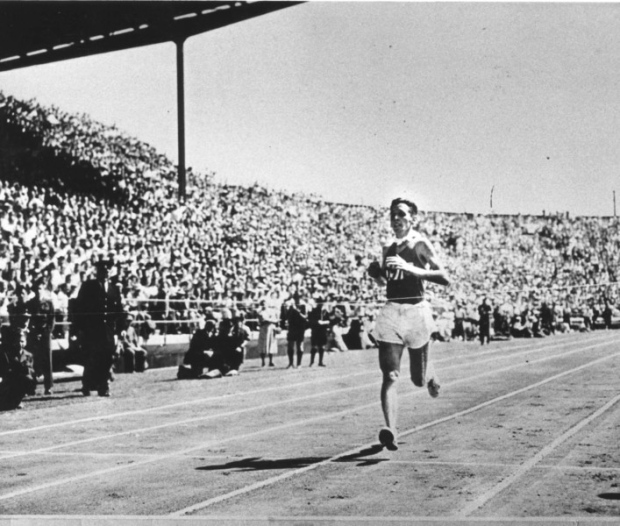
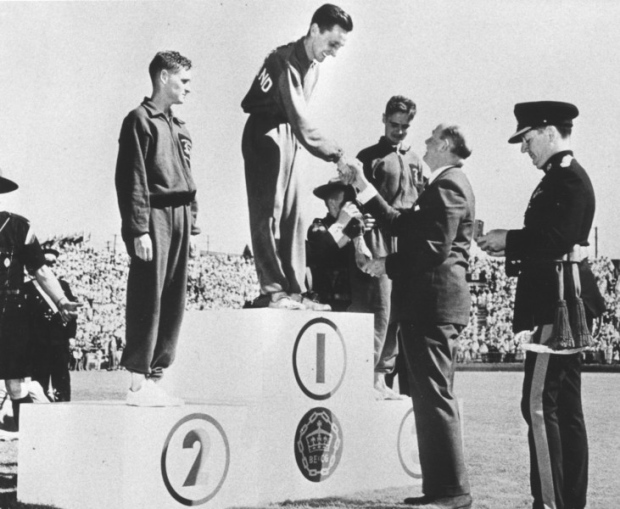
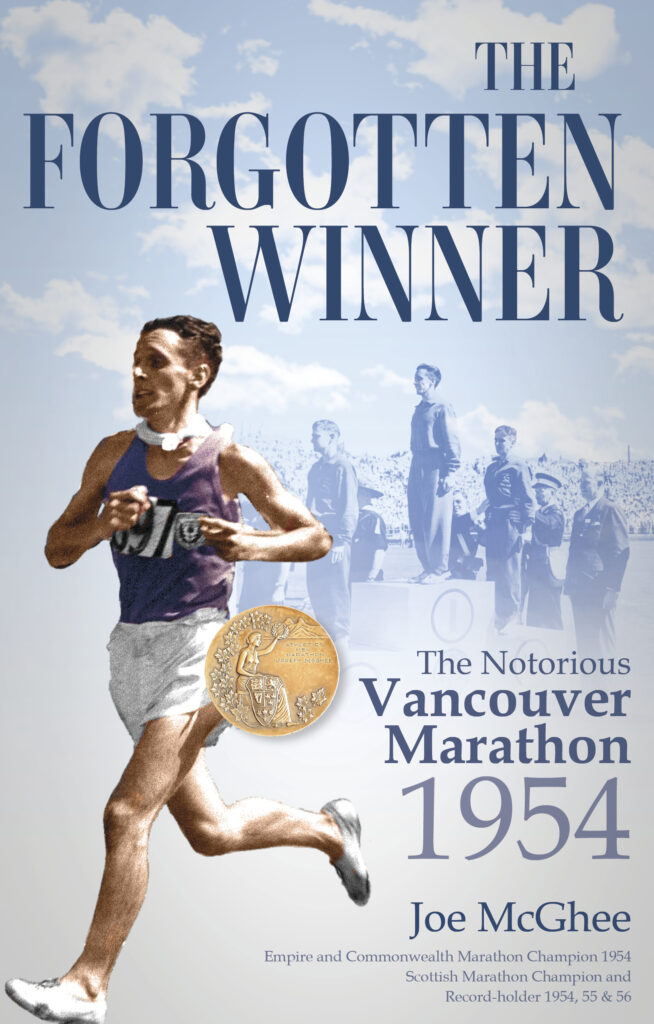
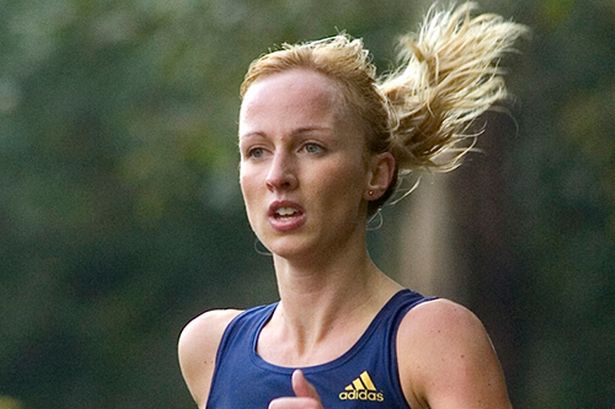
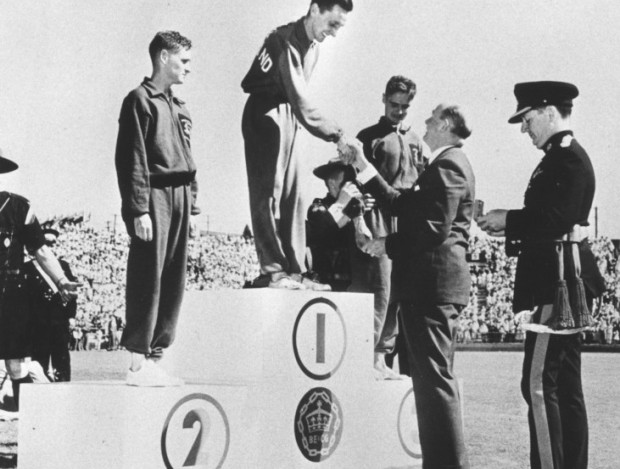
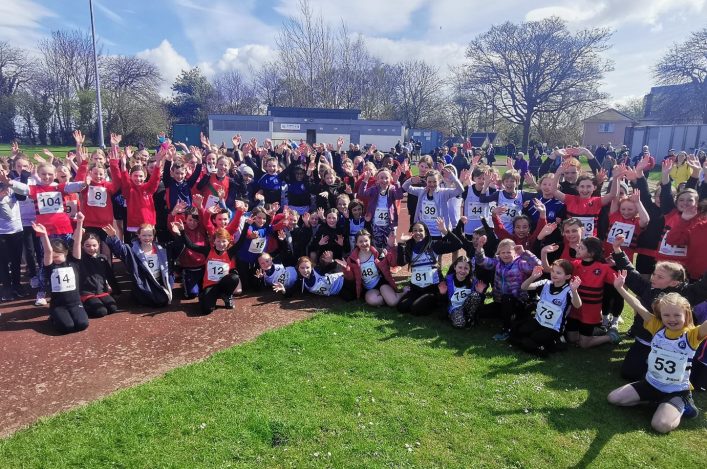
Latest Facebook update
2 days ago
Photo
Share on Facebook Share on Twitter Share on Linked In Share by Email